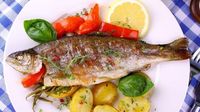On Good Friday, April 18, 2025, many Christians around the world will observe a tradition that has deep roots in their faith. This day, which commemorates the crucifixion of Jesus Christ, is marked by a strict fast, particularly within the Catholic Church. As part of this observance, meat is traditionally forbidden, and fish is often the meal of choice.
The significance of Good Friday is profound. It is believed that Jesus was crucified on this day, and Christians use this time to reflect on his suffering and sacrifice. The fasting regulations, particularly in the Diocese of Augsburg, state that Christians should abstain from meat dishes and ideally consume only one meal. This practice is primarily observed by Catholics as a way to empathize with Jesus's suffering.
Interestingly, the tradition of eating fish on Good Friday is not just a culinary choice; it carries symbolic meaning as well. The Greek word for fish, "Ichthys," is an acronym that translates to "Jesus Christ, God's Son, Savior." Early Christians adopted the fish as a secret symbol of their faith, making it a fitting meal for this solemn occasion.
According to a survey commissioned by Iglo, about 22% of Austrians adhere to the tradition of eating fish on Good Friday, while an additional 27% do so occasionally. However, the choice of meal can often depend on personal preferences. For some, traditional fish dishes might not appeal, leading to a variety of alternatives.
In Vorarlberg, a region in Austria, the conscious renunciation of meat remains highly valued on Good Friday. Families often uphold traditions that shape their eating habits. For example, Erich Asanger from Hohenems insists, "On Good Friday, I always eat fish. For us, it's tradition." In contrast, the Sedenmayer family from Styria opts for Käsespätzle, a type of cheese noodle. Claudia, the mother, notes that they generally consume little meat.
Other families, like that of Michelle Makoru, also refrain from eating meat on Good Friday, favoring delicious vegetarian options such as vegetable dishes, falafel, and vegetable lasagna. However, not everyone strictly follows the tradition. John Armenio from Gaißau identifies as Catholic but admits he is not stringent about abstaining from meat, indicating that his family might have fish or vegetables instead.
In a social media survey conducted by VOL.AT, nearly 500 participants shared their plans for Good Friday. The results showed that 60% intend to abstain from meat, while 23% will eat meat, and 17% remain undecided.
The question arises: must it really be fish? While fish is a common choice, many delicious alternatives can provide a nutritious meal on Good Friday. Vegetable dishes, soups, salads, and even vegan options like vegan sausages or burgers can cater to various tastes. However, egg dishes are generally avoided due to the upcoming Easter celebrations.
As the tradition of abstaining from meat on Good Friday continues, it is worth noting that the historical context of this practice has evolved. In Germany, the decision to fast or abstain from meat is now left to the individual, and the regulations have been relaxed over time. Seniors, sick individuals, children under 14, and those engaged in physically demanding work are exempt from fasting.
Interestingly, the beaver has also found its way into the culinary landscape during Lent. In Bavaria, a recipe from 1802 suggests cooking beaver as a substitute for lamb, especially during fasting periods. This reflects the creativity of Catholics who sought to adhere to fasting rules while still enjoying a hearty meal. The beaver, often considered a fish due to its aquatic nature, can be prepared in various ways, from stew to schnitzel.
Gerhard Schwab, a beaver manager for the Bund Naturschutz in southern Bavaria, has experience cooking beaver and claims that a young beaver's taste is hard to distinguish from beef. However, older beavers develop a unique flavor profile. With approximately 50,000 beavers in Germany, half of which reside in Bavaria, the species has made a significant comeback. This resurgence has led to legal debates regarding their management, particularly concerning the killing of beavers near roads and railways.
Despite the beaver's potential as a food source, strict regulations govern its hunting and consumption. The Federal Nature Conservation Act protects beavers, and any hunting must be authorized by local authorities. Hunters can consume the meat themselves but cannot sell it commercially. This means that while traditional recipes might exist, they are unlikely to see widespread revival in restaurants.
As the day approaches, families will continue to navigate their choices for Good Friday meals, balancing tradition with personal preference. Whether it’s fish, beaver, or a hearty vegetable dish, the essence of Good Friday remains: a time for reflection, community, and the sharing of meals that honor the spirit of the day.







